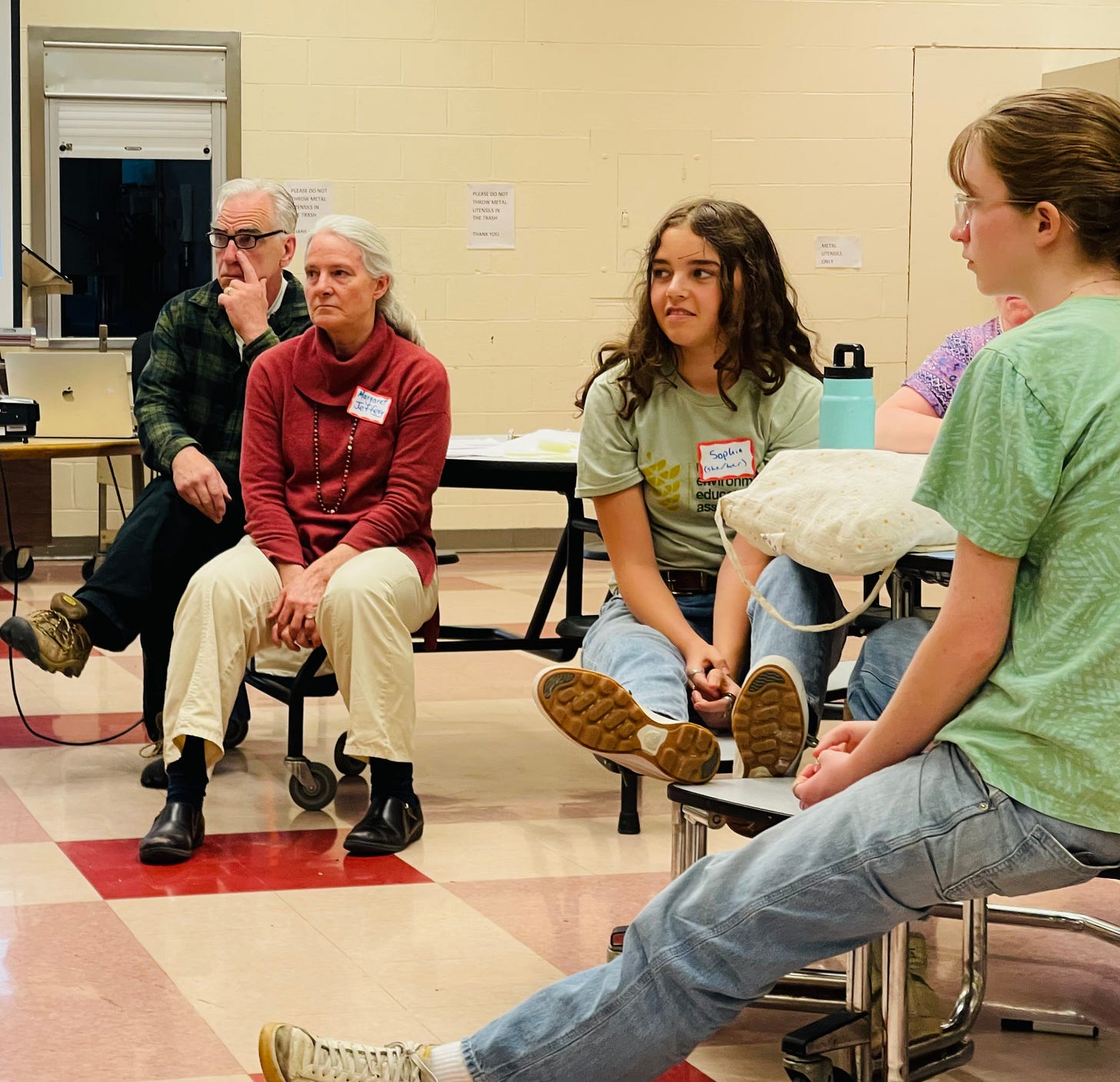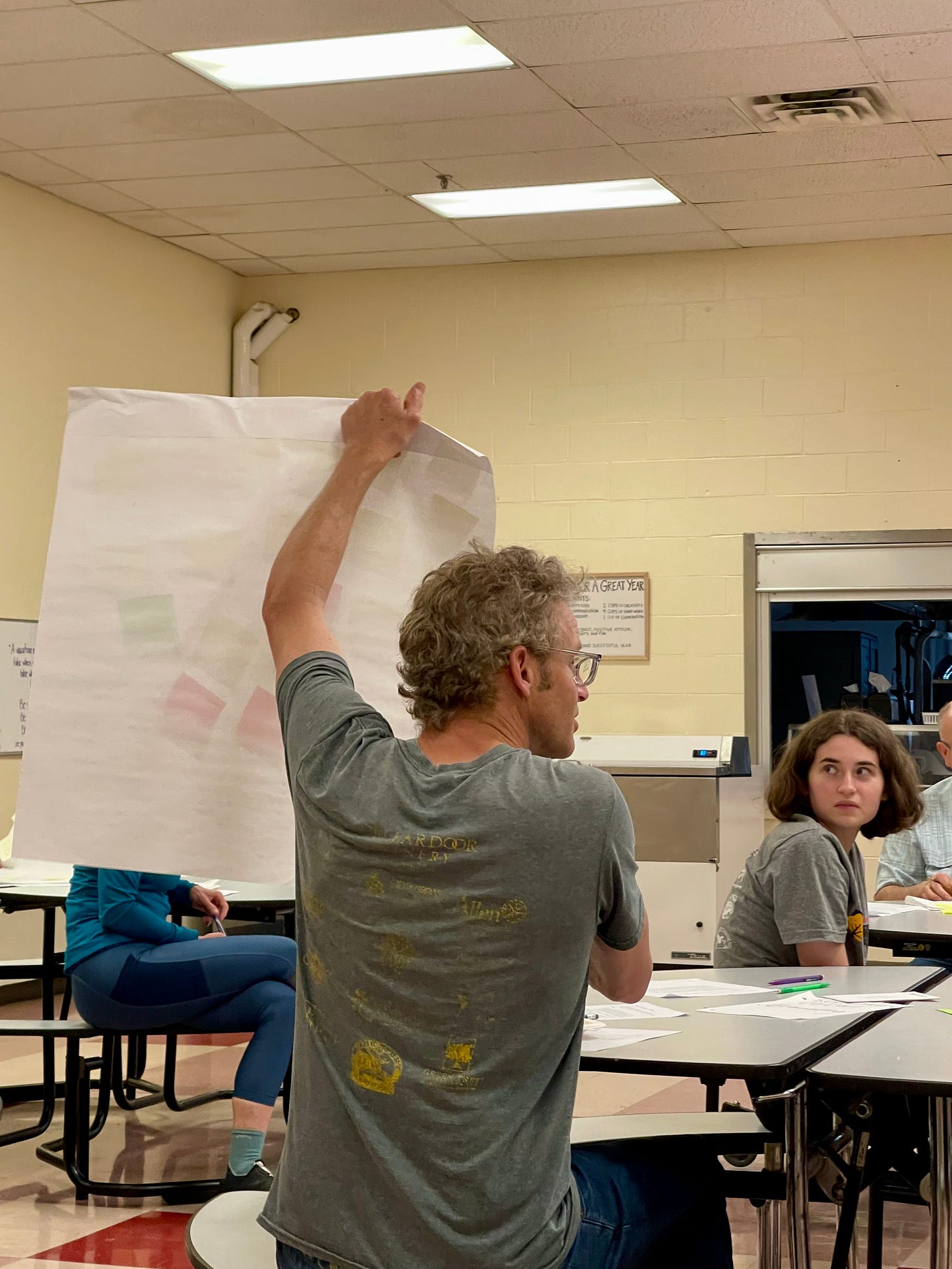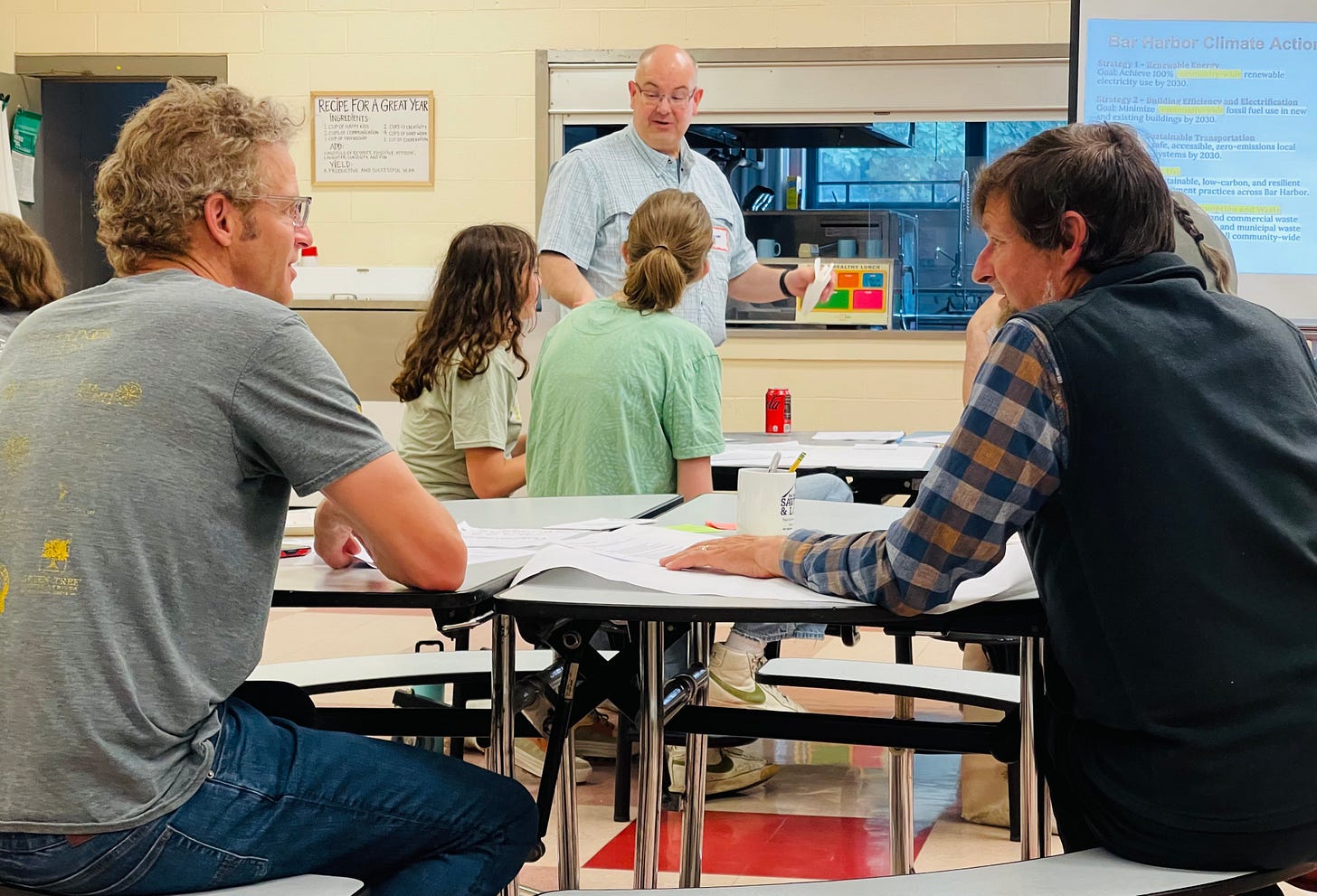Climate Action Plan About More Than Doom and Gloom
Task Force holds listening session to glean proactive possibilities
BAR HARBOR—Though the school year had finished a week before, there was a hum in the Conners Emerson cafeteria on Thursday afternoon, June 15, as the Bar Harbor Task Force on the Climate Emergency hosted a Bar Harbor Climate Action Planning listening session. The goal was to try to get feedback, thoughts, and criticisms about climate change and the community.
Standing in front of an old-school projector screen, Task Force Chair Ruth Poland introduced the session with a quick rundown of the task force’s recent work.
According to its bylaws, the task force was formed in 2020 and is meant “to define and recommend climate goals with the objective of drawing down carbon from the atmosphere and reducing community-wide greenhouse gas emissions by December 31, 2030.” Governor Janet Mills pledged three years ago that by 2045, Maine will be carbon-neutral. Being carbon-neutral basically means that you put out the same amount of carbon as you offset.
The hope is that by becoming carbon-neutral, people, communities, and businesses can help decrease greenhouse gasses. As MIT’s Climate Portal explains, “Greenhouse gases are gases—like carbon dioxide (CO2), methane, and nitrous oxide—that keep the Earth warmer than it would be without them.”

The Bar Harbor task force is just a small (currently 10-people strong) town-appointed group of volunteers working in a small community on a small island facing a worldwide problem. Thursday afternoon? Size didn’t matter. What mattered was brainstorming solutions for Bar Harbor and possibly all of MDI. Together.
Council Chair Val Peacock and Vice Chair Gary Friedmann as well as Planning Director Michele Gagnon and Warrant Committee member Ezra Sassaman attended the event, sitting at the table with other members of the public as they discussed using compost, restaurant waste, renewable energy, and more.
It’s an exercise that’s not limited to Bar Harbor or its town government. The Mount Desert Island Historical Society, Acadia National Park, Friends of Acadia, Schoodic Institute, and multiple classroom teachers are just a few of the groups and individuals planning for (and dealing with) changes in the climate.
Nationwide, the New York Times just published an article about New Jersey teaching climate change at all grades. Much like the sub-headline for the Times, the focus at the listening session was “problem solving, not doom and gloom.” However, unlike a New Jersey first grade classroom featured in the article, no one at the Bar Harbor session suggested putting penguins in refrigerators to help them survive a warming Antarctica. It was much more concrete and geared toward Bar Harbor.
Much like a household, a lot of different elements create a municipality’s emission’s footprint. Decreasing Bar Harbor’s footprint by 2030 is the task force’s goal.
The task force completed a municipal greenhouse gas audit for 2019-2020. They had a follow-up audit with similar results.
“We use a ton of heating oil and a ton of electricity,” Poland said of the report’s results. The task force also created a living document of a first climate action plan and created a sustainability coordinator position, which was filled in June 2022 until winter 2023. Poland said the group hopes that position will be funded and filled again.
The group has also been a part of grants given to the town to help reduce its carbon footprint. Bar Harbor received a Regional Community Resilience Partnership grant for $150,000 for EV chargers, outreach, and education in June 2022. It also received a town CRP grant for $50,000 for the Municipal Building’s electrification work in September 2022. That work hasn’t yet begun.
This summer the task force members hope to redraft the climate action plan, hire a sustainability coordinator, install new EV chargers at the Town Hill and downtown ball field, and begin work with the Gulf of Maine Research Institute on sea level rise vulnerability assessment. That work would seem to align with work in the Landscape of Change project, the historical society’s initiative with Acadia National Park, Schoodic Institute, the Mount Desert Island Biological Laboratory, College of the Atlantic, and A Climate to Thrive
In the upcoming year, there will be multiple outreach events hosted by A Climate To Thrive, including a town-wide electric vehicle forum and climate solutions fair, and resilience training for how to deal with seal level rise.
LISTENING SESSION
At Thursday’s event, task force members set up six tables and at each table were a number of different strategies. Participants spent 15 minutes at each table. After that time, participants moved to the next table. There was a facilitator at each table.
Before the session began, people gathered in couplets and trios and an occasional quartet, talking, creating community, and finding some pizza. Smatterings of their conversation drummed against the beige-gray walls of the cafeteria as old friends and new met up and began discussing life and solutions in drifts of lines and snippets.
Use it or lose it…
Special proprietary…
They need a time machine there so they can get quarters. At least get a quarter an hour.
The moths.
Right. Right.
This black mold stuff…
I heard you and Steve were going to be mucking on Saturday.
I haven’t had as many worms this year…
Have you had any pizza?
During the short general discussion at the end of the meeting, those lines of conversation had coalesced to snippets of possible action and hope and questions.
“We have to do a better job of getting information out there,” Poland said about what is happening in the climate as well as at the task force level. The question becomes how to do that.
Participants wrote ideas and thoughts on Post-it notes that were then stuck to paper at each round cafeteria table.
Vice Chair Tobin Peacock spoke about his table’s discussion of tourism and restaurant waste. What does it mean to establish Bar Harbor as a green tourism destination, he asked. How do you define green tourism? How can we celebrate businesses for the good things they do? And then, how do you foster ideas within businesses and the community at large to be more green? How do you build a sustainable local economy and sustainable local community? And he also asked how you make people realize that “community and economy aren’t two separate things.”
One woman said, “There are a lot of good ideas on these Post-its. Some of them are global and some of them are micro.”
Her table said that the town needs more frequent and varied waste audits. And though there are so many current issues with composting and the MRC contract, the town still needs to encourage it. Her table’s ideas included a need to associate a cost to throwing away trash to make people cognizant of their waste. Participants also spoke of encouraging local food systems but wondered how to do that at the municipal level.
Task force member Brian Booher’s table focused on renewable energy, and he had possibly the most questions, asking that there are a lot of interesting conversations, but what does it all mean? But more than that, he wondered about the how. How do you electrify everything? How do you get the community to be motivated to change when some don’t believe in climate change?
“We don’t have a sustainability heat squad that’s going to people’s houses,” he said to chuckles. So, he said, it’s about persuasion and encouragement for the community at large. And for a lot of people that’s about saving money. Saving money and saving the environment can go hand in hand.
GROHOSKI TO DISCUSS PINE TREE POWER AT BAR HARBOR FARM VISIT
Local solar advocates cite Versant Power’s obstruction of clean energy projects on Mount Desert Island as one reason to support Pine Tree Power. This consumer owned utility would replace Versant with Maine controlled management committed to better service, fewer power outages, lower rates, and more solar power.
Sen. Grohoski will talk at Bar Harbor Farm on Sunday, June 25 about the citizen’s initiative on this November’s ballot, which was drawn from the consumer owned utility bill she sponsored in the State House. This legislation passed with bipartisan majorities in the House and Senate, but was vetoed by the governor.
Versant is ranked by JD Power as the third-least popular mid to large size utility in the nation, just two rungs up from CMP.
Versant is owned by the City of Calgary, in Canada, whose residents enjoy much lower rates than what Maine customers pay. Rather than extracting money from its customers for the benefit of a foreign government, a consumer owned utility would focus on the transition to a clean and fair energy economy.
This event, open to the public, will run from 4:00 to 6:00 on June 25 at Bar Harbor Farm, 115 Gilbert Farm Road, with refreshments and farm tours.
LINKS TO LEARN MORE
https://www.barharbormaine.gov/468/Task-Force-on-the-Climate-Emergency
To email the task force, send to tfclimate@barharbormaine.gov
















